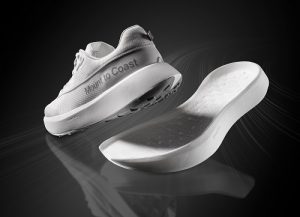The latest PR from BASF of Germany informs the public from the possibility of producing the midsole of running shoes by a new biopolymer grade of BASF materials. According to the press release the highlights are:
- Innovative midsole by ultrarunning brand Mount to Coast combines high performance with sustainability
- Biomass-balanced ecoflex® supports the footwear industry to increase use of renewable feedstock
- Mount to Coast and BASF enter into strategic cooperation to explore potential of biopolymers for sports shoes
The full text of the latest BASF press release is as follow:
**************************************
The footwear specialist for ultrarunning and long-distance shoes, Mount to Coast, Hong Kong, China, and BASF, Ludwigshafen, Germany have entered into a strategic partnership to explore high-performance, sustainable solutions for runners. CircleCELL™, an innovative midsole, is the first footwear technology the collaboration has produced. Based on BASF’s new biopolymer ecoflex® BMB, the new midsole is 90% more durable while showing the same energy return as midsoles made of polyether block amide (PEBA), a material widely used for performance running shoes.
In ecoflex® BMB, fossil raw materials are replaced with renewable feedstock at the beginning of the production  process. The renewable feedstock comes from organic waste and residual biomass and is attributed to the ecoflex® grade via a mass balance approach which is certified according to REDcert2 and ISCC PLUS (1). Thus biomass-balanced ecoflex® supports Mount to Coast in increasing the use of renewable feedstocks in its unique process of foaming the CircleCELL™ midsole while preserving the characteristics performance shoes require, most importantly, durability. In-house tests by BASF have shown that ecoflex® BMB outperforms other midsole materials in density and rebound.
process. The renewable feedstock comes from organic waste and residual biomass and is attributed to the ecoflex® grade via a mass balance approach which is certified according to REDcert2 and ISCC PLUS (1). Thus biomass-balanced ecoflex® supports Mount to Coast in increasing the use of renewable feedstocks in its unique process of foaming the CircleCELL™ midsole while preserving the characteristics performance shoes require, most importantly, durability. In-house tests by BASF have shown that ecoflex® BMB outperforms other midsole materials in density and rebound.
“We are committed to creating shoes through sustainable materials and innovative processes without compromising the specific performance needs of ultrarunners,” says Yeti Zhang, Mount to Coast’s head of product. “BASF has been a crucial partner in supporting our product development team as we search for ways to balance durability and sustainability. Their creativity in introducing mature technology from one industry into a new space, like the footwear industry, is inspiring and aligns with our goals to offer the running community new performance solutions. We are excited to continue working with a world-renowned company advancing biopolymers.”
Marcel Philipp Barth, head of global business management Biopolymers at BASF adds: “Since 1998, when ecoflex® was introduced on the plastics market, customers in many different industries have come to know and trust it for its consistently high quality, performance and the sustainability benefits it brings to their products. So we are excited to bring BASF know-how on circularity and renewable resources to new application fields, to inspire customers to think of new applications made of our biopolymers. We are looking forward to further exploring this path with Mount to Coast in the footwear industry: They can rely on our on-site application support, our proven capabilities to constantly improve footwear materials which are globally available.” Ecoflex® BMB thus perfectly fits into BASF’s pioneering footwear solutions and deep expertise of the entire value chain for cost-effectively creating shoes that are lighter, more comfortable and durable.
Biomass balance approach
In the biomass balance approach, the fossil feedstocks in the first steps of the manufacturing process are replaced by waste-based renewable resources. The renewable amount is then attributed to specific products at the end of the manufacturing process by means of a third-party certified method. This independent certification confirms that BASF has replaced the required quantities of fossil feedstock for the biomass balanced product that customers buy with renewable feedstock according to the REDcert2 and ISCC PLUS requirements.
Further information:
(1) REDcert2 and ISCC PLUS are sustainability certification schemes for the use of sustainable biomass as raw material in the chemical industry. A certification according to these certification schemes confirms that the biomass used is sustainable and has been fed into the production system in the required amount. It also confirms that the sustainable biomass has been correctly attributed to the corresponding sales products. The certifications are awarded on the basis of on-site audits conducted by independent auditors.
Notice: Text and photo from BASF and links by pimi’s Editorial team












